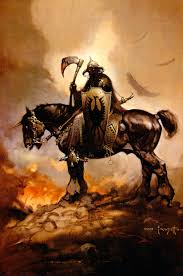To fight Taliban, US eyes Afghan tribes
Afghan arbakai push out Taliban
A year ago in Nangarhar Province, they were sorely needed. Taliban fighters had returned to the caves of Tora Bora – the last known Afghan hideout of Osama bin Laden in 2001. From Tora Bora, they struck American forces in the district. In one ambush, they disabled an American Humvee that later had to be recovered by Afghan soldiers, says Zahir, the elder.
Then, after an attack on the district headquarters itself, Governor Gul Agha Sherzai asked Zahir, a member of his administration and an elder from the area, what could be done.
First, Zahir talked to the elders of the district. Then he delivered his message to Governor Sherzai: “I told Sherzai to go back to Jalalabad, and I will be able to defend my area.”
“I don’t need a tank, I don’t need a plane, I don’t even need a single bullet,” he recalls saying to the governor. “I will use sticks and I will use the guns my people have to defend themselves.”
Together with the elders, Zahir collected 600 volunteers. “But as soon as they [the Taliban] had learned what we decided, they left,” Zahir says.
It is efforts like these that the US is seeking to formalize and make part of a coherent Afghan strategy – a dramatic shift from even a year ago.
In January, Gen. Dan McNeill, then commander of NATO forces in Afghanistan, dismissed the idea of supporting arbakai as applicable only in a few provinces, “and it’s not likely to work beyond those geographic locations.”
So use it where it will work. Use it where one tribe dominates the village or district. Use it where the maliks are respected and the jirgas meet regularly. Soviet invasion, civil war, Taliban rule, and the last seven years have been tough on traditional Pashtun ways of doing things. Sort of like what small pox, winter campaigns, buffalo hunters and reservations did to our Plains tribes. Taliban commanders and war lords have been undermining the maliks for decades. The opium cartels buy maliks, and they pay better than Kabul. Pashtun tribes aren’t like Iraqi tribes in Anbar. Fine. Improvise, adapt, overcome and get some Popular Forces wherever we can. Their feet won’t be in boots, but they’re already on the ground and we could use the augmentation.
The writ of Kabul has never run all that far. In the old days, what law and order there was amongst the Pashtuns was based on the Pashtunwali, their tribal code of honor, as interpreted by individual tribesmen, maliks, elders, and jirgas, enforced by the power of public opinion and the arbakai, the men responsible for the enforcement and implementation of the Jirga decisions. In ancient Aryan tribes, the Arbakai led groups of warriors in wartime and maintained law and order in peacetime. Today, they take orders from a commander. They are given considerable immunity in their communities and cannot be harmed or disobeyed. Those who flout these rules are subject to the punishments set by the Arbakai organization. I have compared them previously to Cheyenne Dog Soldiers. An inexact comparison, to be sure, but my target audience in the Amriki tribe are acquainted with Plains Indians soldier societies, while the intricacies of Ghaznavid ethnology glaze the eyes.
Honest Tajik Dudley Dorights like Col. Jalil Shamal of the Afghan National Police are too scarce.
See also:
Arbakai @ [My] State Failure Blog
Arbakai Aim to Protect Their Villages in Afghanistan @ Development News from Afghanistan
CLC’s Good, Arbakai Bad
We will also work to increase the involvement of Afghan tribes.
Afghan tribes will not fit into a modern framework
The Death of the Anbar Militia Strategy in Afghanistan @ Ghosts of Alexander






Cannoneer, I worked with Colonel Shamal when he was in Kapisa Province. Diminutive and sharp, he commands respect from his sarboza. He was interim Provincial ANP Commander after they moved a General to Wardak in July of 2007. Shamal is capable and loyal to the IRoA and also plays the local political game well. I’m pretty sure it’s the same guy. It’s a small war.
How do we get more like him, Old Blue? Does he have many ethnic Pashtun peers in the ANP? Or is he Pashtun? My perception has been managed to think that “capable and loyal to the IRoA” is a description that accurately describes painfully few Pashtuns.
Pingback: Good Guy Militias — ‘community based local defence forces’ « Civilian Irregular Information Defense Group
Pingback: Wardak Awakening « Civilian Irregular Information Defense Group
Pingback: Civil Defense Forces « Civilian Irregular Information Defense Group
Pingback: Mangal Tribal Police « Civilian Irregular Information Defense Group